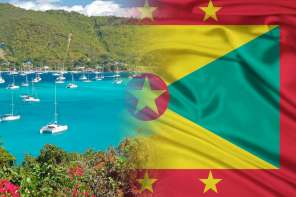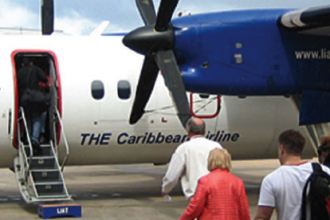As a preparatory step to rendering marijuana as a legal substance, the CARICOM Regional Commission on Marijuana recommended the decriminalization of the drug for personal use in private premises and medical purposes.
The Caribbean Community (CARICOM) Regional Commission on Marijuana has recommended the declassification of marijuana as a dangerous drug in all legislation and the reclassification of the drug as a controlled substance in its report presented at the CARICOM Heads of Government Meeting in Montego Bay, Jamaica, held from July 4-6.
The Commission presented its findings and recommendations into the social, economic, health and legal issues surrounding marijuana use in the Caribbean.
“The Commission believes that the end goal for CARICOM should be the dismantling of prohibition in its totality, to be replaced by a strictly regulated framework akin to that for alcohol and tobacco, which are harmful substances that are not criminalized,” the report said.
It continued that: “The Commission is unanimous in its view that the current classification for cannabis/marijuana as a dangerous drug with no value or narcotic, should be changed to a classification of cannabis as a controlled substance.
“The Commission is unanimous in its view that, ultimately, legal policy toward marijuana should be informed, not by punitive approaches, but by public health rationales, within a human rights, social justice and developmental perspective.
“A too-limited approach to law reform, including one that focuses only on medical marijuana, would be counterproductive and inimical to the goals of Caribbean development, as outlined in the SDGs (Sustainable Development Goals) and endorsed by CARICOM.
“Consequently, there is consensus that all criminal penalties from marijuana laws should be removed.
“If only decriminalization is envisaged, reasonable fines and compulsory rehabilitative treatment should be substituted.”
Among its recommendations, the Commission suggested retroactivity to correct past injustices, such as expunging criminal records.
As a preparatory step to rendering marijuana as a legal substance, the Commission recommended the decriminalization of the drug for personal use in private premises and medical purposes.
The report noted that the drug should be banned in public spaces.
The Commission also recommended that customs law be amended to make provision for the import and export of cannabis and cannabis products, and suggested that commercial cannabis activity be decriminalized or legalized to avoid the implications of anti-money laundering legislation and proceeds of crime legislation.
The report noted that small farmers and small business-people should be included in production and supply arrangements, with appropriate controls limiting large enterprise and foreign involvement, and an equitable land use policy for marijuana cultivation should be formulated.
The implementation of “moderate taxes” was also recommended to ensure that the “black market is not reinvigorated”.
The report also suggested that full prohibition for children and adolescents with an appropriate age limit should be maintained, with exception for medical reasons.
For young people who do use marijuana, treatment and diversion programmes are to be implemented instead of prosecution or criminalization.
The Commission also noted special provisions to regulate marijuana for medical purposes where access to medical marijuana should be made for qualifying conditions.
There were several other key recommendations made by the Commission for law reform surrounding the substance.
“After holding national consultations receiving several submissions and a petition from the public, reviewing data from polls and surveys from several countries, it is clear that in the region, attitudes toward cannabis have changed in recent times,” the Commission noted in its executive summary.
“There is now overwhelming support for law reform, moving away from the prohibition on cannabis and consequent criminalization.
“This holds true not only from the data, but the many prominent persons and groups that have lent their voice to this cause from all walks of life, including church leaders, magistrates, judges, social workers, educators, doctors, chief justices, DPPs, Members of Parliament and senior members of the bar.”
The Commission noted that the majority of Caribbean people believe that marijuana laws are “ineffective, discriminatory, deeply unjust, unfit for purpose” and they “violate rights and lack legitimacy”.
“They also believe that prohibition is preventing the region from taking advantage of the economic opportunities in the cannabis industry and medical research and prohibiting access to medicine that can heal them more effectively and cheaply than traditional pharmaceuticals,” the report noted.
The Commission said that change is necessary, but there are not sufficient conditions for it.
It noted that the existing prohibitionist regime induces more harm than any possible adverse consequences of marijuana itself.
“The analysis of the comprehensive information gathered indicates that the current legal regime for cannabis/marijuana, characterized as it is by prohibition and draconian criminal penalties, is ineffective, incongruous, obsolete and deeply unjust,” the report said.
“After considering the most up-to-date evidence and the views of Caribbean people, the Commission is unanimous in its view that the status quo with respect to the legal regime governing cannabis/marijuana cannot be maintained and legal reform should be a priority for member states.”
Economic benefits
The report also provided reasons why the prohibition of marijuana denies the CARICOM region of substantial economic benefits.
“An economics study commissioned for the Commission illustrates that the highest financial benefits will come from a fully-legalized model that is strictly regulated and the lowest benefit will come from decriminalizing only,” the report stated.
“The economics study illustrates that prices inflated because of the black market will fall with liberalization.
“Consideration should be given to establishing fixed prices and moderate taxes, taking care not to re-kindle the black market.
“While prices will fall, revenue will accrue because of sales, taxes and related measures.”
The Commission said the region’s already established and developing tourism economy can be leveraged further by a cannabis industry located in safe and secure environments.
“Cannabis can be produced for export as well as for local healing and can be the foundation for a new and vibrant wellness tourism industry,” the report said.
“Savings will also accrue as a result of lower public health bills as Caribbean nationals substitute expensive pharmaceutical drugs with often more effective cannabis at lower costs and often with lower side effects.
“The development of an industrial hemp industry is also envisaged.”
Fears
The Commission noted that there are legitimate concerns about the legalization of the substance on adverse impacts on health, the youth, increased use and the supposed incapacity of institutional resources.
The report, however, noted that these fears have been assuaged through modern scientific research and the Commission is satisfied that they can be appropriately addressed through a responsible framework for law reform.
The Commission noted that its observation of law reform in Jamaica reveals that there has not been any discernible increase in use and also no increase in psychosis cases.
“Further, criminal arrests have decreased and Jamaica has begun to reap benefits from the cannabis industry,” the report stated.
The Commission said that while it accepts that marijuana is a substance with psychoactive properties, it is satisfied that significant support exists in the literature with regard to the potential beneficial and adverse effects associated with marijuana, such that a realistic law reform process and regulatory regime can be designed.
“On balance, after evaluating the scientific data and testimonies from the public, the Commission is of the view that the proven medical benefits of cannabis/marijuana in several areas outweigh the risks,” the report said.
“This finding is consistent with those of numerous other national bodies/commissions in the region and globally and that of international bodies, the most influential of which have labeled the current legal regime redundant and obstructionist.”
The report also noted that, despite its illegal status, marijuana is readily available and its use is prevalent across the region and across all classes, races and social statuses.
“The prohibitionist legal regime and the harsh penalties, remnants of a now discredited ‘war on drugs’ approach, have failed to deter usage,” the report said.
“Law enforcement personnel themselves complain about this ineffective, wasteful system and believe that their resources are better employed fighting serious crime.
“They debunk myths that cannabis/marijuana is a causative factor in criminal conduct and believe that most persons use for stress relief.”
The Commission said continued prohibition of the drug perpetuates the illicit market, which has negative implications for citizen security and attempts to ensure quality and safety in products.
The conversation on the legalization of marijuana in The Bahamas was sparked when the Commission held a town hall meeting on January 5.
The Commission opened the floor for comments from the public, and many people took the opportunity to speak to the issue, outlining what they believe to be the economic, social and health benefits of the drug being legalized or decriminalized.
The majority of people who spoke at the meeting were in support of the legalization or decriminalization of marijuana in The Bahamas.




